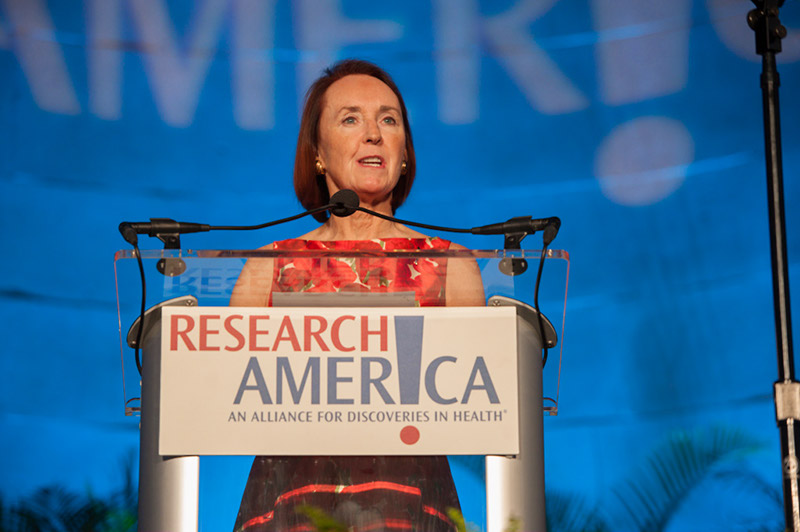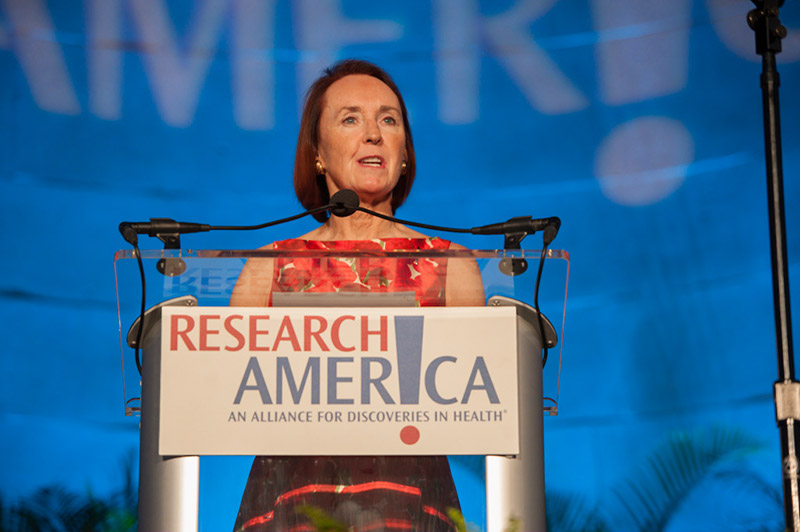See Clearly, Act Boldly, Embrace Change

 Dear Research Advocate,
Dear Research Advocate,
The remainder of 2021 will test whether our nation heeds a warning that speakers at our National Health Research Forum last week stressed again and again: the U.S. can no longer conduct business as usual as existential threats mount. Instead, we need to gather the courage to see clearly, act boldly, and embrace change.
Mikael Dolsten, MD, PhD, chief scientific officer and president, Worldwide Research, Development, and Medical, Pfizer Inc, and a Research!America board member, offered particularly compelling comments in this regard at our Forum:
“I think we need to invest more in understanding: what does it take to create an innovation culture for the country? What does it take to create the social fabric that wants ideas to come? And I think we need to be willing to ask the difficult questions, not just… say we are great, but really look at the things we do not-as-great, and show that we’re willing to reflect and learn things in a new way.”
What does it take to create an innovation culture for the country? There is abundant food for thought in that regard throughout the Forum, available now on YouTube.
On the Hill: Expect a bumpy ride on Capitol Hill over the next few weeks — the fiscal year ends on September 30. The possibility of a government shutdown, while remote, is nonetheless real, and a continuing resolution (CR) extending current federal funding levels until later in 2021 is all but certain. Although better than a shutdown, the flat funding and stalled action a CR imposes is nothing to applaud, particularly given the clear need for bold, timely action.
The House and Senate continue preliminary negotiations on the reconciliation package, which could contain welcome funding for public health and NSF, but also could trigger controversial changes to drug pricing. Last week we wrote a letter calling for a clear-eyed analysis of the direct and indirect effects of these pricing provisions, since the wellbeing of patients and the nature and pace of medical progress hang in the balance. We will keep you apprised as the reconciliation process moves forward.
We understand that efforts are ongoing to meld the U.S. Innovation and Competition Act (USICA) (S.1260) and the NSF for the Future Act (H.R.2225), bills aimed at significantly bolstering U.S. science & technology capabilities. The S&T Action Committee sent a letter to congressional leadership making a compelling case for prioritizing:
- Greater S&T investment (the alternative is vulnerability, a house built on sand)
- Leadership (OSTP is positioned, and now must be empowered, to assure our nation takes strategic action to confront existential threats)
- Coordination/collaboration (the pandemic has illustrated the extraordinary power of alignment and partnerships)
Has your organization endorsed the S&T Action Plan? Here’s how.
A surprisingly slow-moving priority is the need for an across-government plan to prepare for future pandemics and other biological threats. Vice President Harris yesterday announced a $250M commitment to jumpstart a World Bank fund dedicated to global pandemic preparedness. As she stressed, these threats don’t provide grace periods: the next one could descend at any time. President Biden issued an American Pandemic Preparedness proposal earlier this month, but Congress must enact legislation to put a plan into place. Use this editable email to push for bipartisan action now.
It’s not only COVID-19 that ails us: The COVID-19 pandemic has derailed the fight against other infectious diseases like HIV, tuberculosis, and malaria, especially in low- and middle-income countries, according to a new report from The Global Fund. Preventing such backsliding should be part of a comprehensive pandemic plan. Threats like multidrug-resistant TB cross borders. We should be working with the global community now to ensure we do not lose ground against these killers.
Rally for Medical Research: This week marks the 9th annual Rally for Medical Research Hill Day; advocates working together to ensure funding for NIH remains a national priority. Join the cause by using #RallyMedRes and @rallyforNIH on Twitter.
Alliance Meeting Recap: Aisling McDonough and Emma Alme, PhD, from the office of House E&C Health Subcommittee Chair Anna G. Eshoo (D-CA) were our guests for a member-only session about the Chair’s priorities for ARPA-H legislation. (Contact us if you missed it.)
Upcoming Alliance Meetings: Our next two alliance member meetings focus on issues that receive far less attention than they deserve: the links between oral health and dangerous chronic diseases, and how to reduce the staggering human and fiscal toll of misdiagnosis.
- Register for a conversation with Rena D’Souza, DDS, MS, PhD, Director of the National Institute of Dental and Craniofacial Research, on Tuesday, September 28 at 2 p.m. ET.
- Register for a conversation with Paul Epner, MBA, MEd, CEO of the Society to Improve Diagnosis in Medicine, on Thursday, September 30 at 1 p.m. ET.
Calling All Early-career Researchers: Develop your skills as an advocate and science communicator through the Civic Engagement Microgrant Initiative. This program provides up to $4,000 to support graduate student and postdoc-led groups in their public engagement efforts. Register for our informational webinar (Wednesday, September 29, 1 p.m. ET). Applications are due by October 12. Apply today!
Stay well, stay safe, and stay connected.
Sincerely,
Mary Woolley




